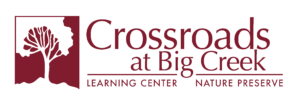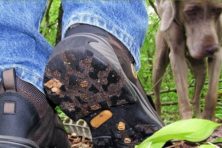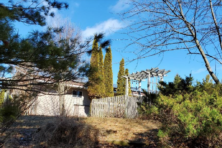Wild Ones: PlayCleanGo
- Share
- Tweet
- Pin
- Share
Understanding and preventing the spread of invasives
Last year brought an increase in our collective appreciation for outdoor activities. People became interested in gardening and landscaping, and many folks took advantage of our local parks and preserves. That’s wonderful, except when the increase in outdoor activity results in the spread of invasive species.
Could it be that while we were trying to avoid infections, we may have been causing infestations?
This week, Crossroads at Big Creek, with support from Wild Ones of the Door Peninsula, is participating in a national campaign called PlayCleanGo Awareness Week. The objective of this campaign, sponsored by the North American Invasive Management Association, is to help people realize that they might be inadvertently transporting the seeds of invasive species from place to place.
All seeds have evolved to be disseminated. If seeds were not spread away from their parent plants, even if they sprouted, they would be too crowded and unable to compete for sunlight, moisture and nutrients.
The part of a plant that helps to ensure successful propagation and dispersal is called the disseminule, and though some plants have elaborate methods of spread, most disseminules are seeds or fruits.
The wind transports many types of seeds, so those have special structures that catch the breeze: Think dandelion fluff or the wings of maple seeds. Animals also disseminate many other types of seeds: Birds swallow whole fruit and berries and eliminate the seeds in their droppings. Blue jays and squirrels transport and bury acorns and other nuts.
Some seeds are covered with specialized structures: tiny barbs, hooks or spines that cling to the fur of animals, the feathers of birds and, alas, the clothing and recreational equipment of humans.
Seeds trapped in the treads of boots are transported to and fro between homes and recreational sites. Many Door County parks and preserves now have boot-brush stations at their trailheads to encourage hikers to wipe off invasives before entry, and a personal boot brush may be a good addition to your daypack.
Fabrics such as wool and fleece act like magnets for burrs and stickers, not to mention dogs’ fur! Oh, my. Most recreational sites require that dogs be on a leash and under control, but even so, pets and people brush up against stickers, which are spread when the burrs are picked off and dropped in the woods or a yard. With the increasing popularity of fat-tire and trail bikes, seeds are spread on muddy tires. Even picnic and camping gear can transport seeds.
Thus, the concept of PlayCleanGo is that it’s great to Play outdoors, but after playing, recreationalists should Clean their clothing and gear before they Go on to another recreational site, or, as members of Wild Ones stress, before they go home.
Coggin Heeringa is the president of Wild Ones of the Door Peninsula and the program director and naturalist at Crossroads at Big Creek in Sturgeon Bay.




